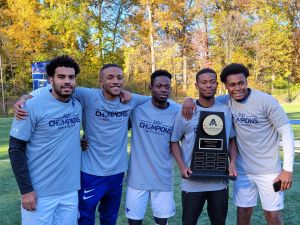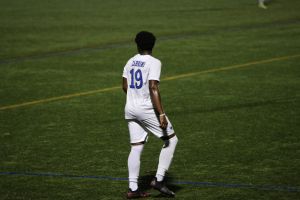Jan. 20 2019.
That is the day that I decided to commit to Cabrini University for soccer. It marked a long and treacherous process that was finally over, allowing me to focus on the rest of my high school career and my next four years of playing soccer at the next level.
I had met some of the other students who committed at an I.D. camp held by Cabrini, and everyone was looking forward to the 2019 season. One thing that I had been blessed with growing up in Burlington is how diverse my school and my team were. Teammates in my high school were African, Asian, Black, White, Latinx and Arabic. I had Muslim teammates, Christian teammates, Jewish teammates, Sikh and atheist teammates.
I was in an environment where all the sports teams reflected that diversity. People from all ends of the world were attending my high school.
Transitioning into college was a culture shock. Firstly, I attended public schooling my whole life so going to a private Catholic institution was different. The first day of classes made me realize that my experience would be entirely different from my high school.
Different doesn’t mean negative or positive. Just different.
The experience of being a Black student-athlete at a predominantly white institution is something I will forever be grateful for. Being one of six Black players on the soccer team and comparing the other sports teams at Cabrini.
Despite only having six black players, my team was one of the most diverse college teams.
That was eye-opening.

I was surprised by that because whether it’s people who had never had a black teammate, or people who went to private schools, that insight provided me with further learning and helped me get a better understanding of the world.
With anything, there are positives as well as negatives. I am a firm believer of sports being a reflection of how the world is. I didn’t want this to be a propaganda piece for Cabrini, or a feel-bad pity story either. I want people to know what it is like to be at Cabrini University as a Black student-athlete.
Viewpoint on Cabrini Athletics
When looking at the school’s coaching dynamic, there aren’t many Black coaches. The only sport where there is more than one Black coach is men’s basketball. In the athletic office, there is one black person on the staff. The lack of representation is what caught my eye.
The counter-argument for my observation is that the people who are in these positions deserve it. I am not questioning that by any means, all of the coaches worked their way to where they are at. I just want to know why there aren’t many Black sports administrators as well as Black coaches.
For a higher-education university that prides itself on diversity, social justice and civility, I think that question deserves to be answered.

Having the athletic director be a woman is very good. Kate Corcoran, Brittany Runyen and Laura Patton are three women who continue to pave the way for women in the sports industry.
One recurring theme that I see in Cabrini athletics is its dedication to success. This starts from the top-down and the athletic achievements from the past are proof of that.
Social experience
The first thing that I noticed when experiencing Cabrini is how many people come from Catholic schooling. Catholic schools in general don’t have a great black population unless it’s an athlete or a person who has the money to go to those schools.
When talking to people who are from that background, it’s interesting to see how a person’s high school experience carries on to college in terms of who they decide to hang out with, what issues they deem most important and how Catholic teachings shaped them.
A lot of kids from that background never really had a plethora of black friends and/or leaders. Comparing how I grew up, it seemed impossible for that to be the case. But looking at demographics and dynamics, it all makes sense now.
It is human nature to be comfortable with people who look and sound like themselves. This is a barrier that needs to be broken by communicating and trying to actively fix the problem.
I enjoy talking to people with different perspectives because the only outcome for me is that I learned something and hopefully I taught a person about my experience.
Playing Experience
Being a part of the men’s soccer team has opened many opportunities, but I think my impact off the field has been more evident than on it. Winning the conference championship was an amazing moment I will never forget, but at the end of the day, it’s not the most important.
What I find most important are my connections, especially when soccer is the gateway to those opportunities. I love to talk to my teammates about how bad Anthony Martial is or how soft Ben Simmons is (even more now that Harden is in Philly). I also enjoy talking about real-world issues that make things uncomfortable as well.
Being uncomfortable is something I had to do my whole life, and that is something that has made me into the person that I am today.
The trials on the field with your teammates help lower that barrier just because of the camaraderie that all of us have for each other.
That being said, people that look like me on campus shouldn’t be the only ones who have to bring up tough discussions. I want to be able to talk about this without having people think that they can’t say certain things or feel suppressed.
At the end of the day, people should be empathetic and have an open mind to different ideas and perspectives.
Whether I am in the classroom or on the soccer field, I continue to embrace our differences as our uniqueness makes both sports and learning that much more enjoyable.




Great perspective, TJ. So many good stories in this issue, but I feel this is the first time anyone asked the questions you have, in print!